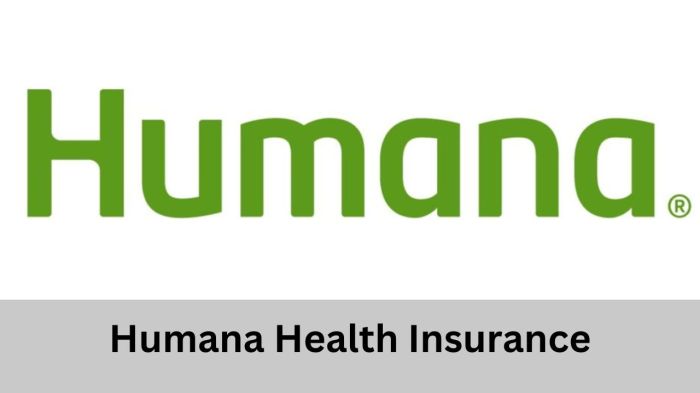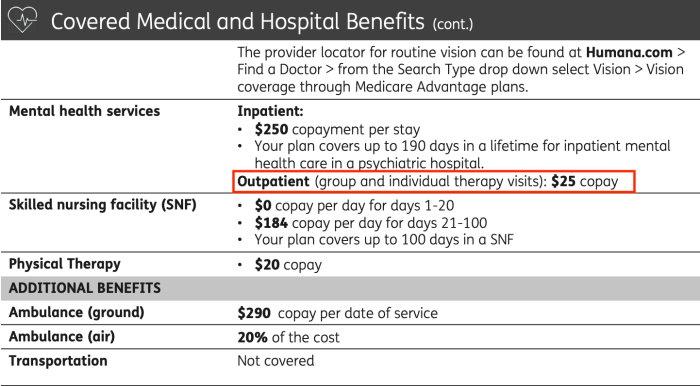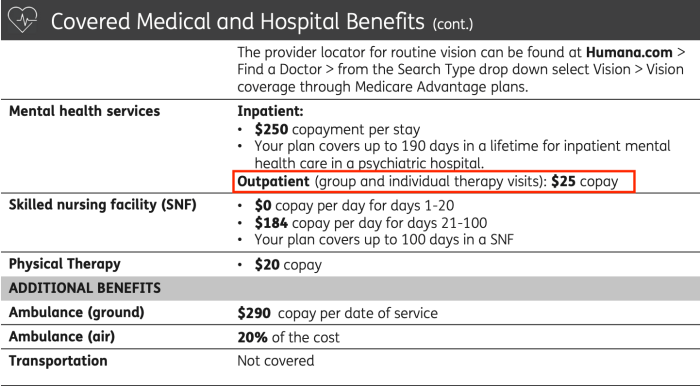Humana medical coverage offers a range of health insurance plans designed to meet diverse needs. From comprehensive coverage to specialized programs, Humana provides options for individuals, families, and businesses. Understanding the intricacies of these plans can be daunting, but this guide aims to simplify the process, empowering you to make informed decisions about your health insurance.
Table of Contents
We’ll explore the different types of Humana plans, delve into their features and benefits, and discuss eligibility requirements, premiums, and coverage details. Additionally, we’ll compare Humana’s offerings to other major health insurance providers, helping you determine if Humana is the right fit for you.
Premiums and Costs: Humana Medical Coverage

Understanding the cost of Humana medical coverage is essential when choosing a plan. Premiums, deductibles, copayments, and coinsurance all play a role in determining your overall healthcare expenses.
Factors Influencing Premiums
Several factors contribute to the cost of Humana medical coverage premiums. These factors can vary based on individual circumstances and plan specifics.
- Age: Generally, older individuals tend to have higher premiums as they are statistically more likely to require healthcare services.
- Location: Premiums can differ based on the geographic location. Areas with higher healthcare costs may have higher premiums.
- Tobacco Use: Smokers often face higher premiums due to the increased risk of health complications associated with smoking.
- Plan Type: The type of plan you choose, such as a Health Maintenance Organization (HMO) or a Preferred Provider Organization (PPO), can significantly impact your premium.
- Coverage Level: The level of coverage you select, such as bronze, silver, gold, or platinum, will influence the premium. Higher coverage levels typically have higher premiums.
- Family Size: The number of people covered under your plan will affect the premium. Adding dependents will generally increase the cost.
Average Monthly Premiums
It’s important to note that these are just examples, and actual premiums can vary widely.
| Plan Type | Average Monthly Premium |
|---|---|
| Bronze HMO | $300 – $400 |
| Silver PPO | $450 – $600 |
| Gold HMO | $650 – $800 |
Cost-Sharing Mechanisms
Cost-sharing mechanisms help to balance the cost of healthcare between the insurance company and the policyholder. These mechanisms include:
- Deductible: The amount you must pay out-of-pocket for healthcare services before your insurance coverage kicks in.
- Copayment: A fixed amount you pay for specific healthcare services, such as doctor’s visits or prescriptions.
- Coinsurance: A percentage of the cost of healthcare services that you are responsible for paying after you have met your deductible.
For example, with a 20% coinsurance, you would pay 20% of the cost of a medical procedure after meeting your deductible, while Humana covers the remaining 80%.
Humana Medicare Advantage Plans

Humana Medicare Advantage plans are a type of health insurance that combines the benefits of Original Medicare (Parts A and B) with additional coverage, such as prescription drugs, vision, dental, and hearing. They are offered by private insurance companies that contract with Medicare. These plans are designed to provide comprehensive healthcare coverage while potentially reducing out-of-pocket costs.
Types of Humana Medicare Advantage Plans
Humana offers various types of Medicare Advantage plans, each with its own benefits, limitations, and costs. Here are the main types:
- Humana HMO (Health Maintenance Organization): These plans typically require you to choose a primary care physician (PCP) within the plan’s network. You must get referrals from your PCP to see specialists. HMOs usually have lower monthly premiums than other types of Medicare Advantage plans.
- Humana PPO (Preferred Provider Organization): PPO plans provide more flexibility than HMOs. You can see any doctor or specialist within the plan’s network without a referral. You’ll generally pay lower costs when you use providers within the network, but you can still access care outside the network at a higher cost.
- Humana POS (Point of Service): POS plans combine features of HMOs and PPOs. They require you to choose a PCP, but you can see specialists outside the network without a referral, although you’ll pay higher out-of-pocket costs.
- Humana Private Fee-for-Service (PFFS): PFFS plans offer the most flexibility. You can see any doctor or specialist, both in and out of network, but you’ll need to pay higher out-of-pocket costs for out-of-network services.
- Humana Special Needs Plans (SNPs): SNPs are designed for people with specific health needs, such as those with chronic conditions or those who are dually eligible for Medicare and Medicaid. They offer extra benefits and services tailored to these individuals.
Benefits and Limitations of Humana Medicare Advantage Plans, Humana medical coverage
Humana Medicare Advantage plans offer several benefits compared to Original Medicare, including:
- Lower monthly premiums: Medicare Advantage plans often have lower monthly premiums than Original Medicare, especially if you choose a plan with a lower level of coverage.
- Prescription drug coverage: Most Medicare Advantage plans include prescription drug coverage (Part D), which is not included in Original Medicare.
- Additional benefits: Many Humana Medicare Advantage plans offer additional benefits that are not covered by Original Medicare, such as vision, dental, hearing, and fitness programs.
- Care coordination: Medicare Advantage plans often provide care coordination services to help you manage your health and prevent unnecessary hospitalizations.
However, there are also some limitations to consider:
- Network restrictions: Medicare Advantage plans generally have a limited network of providers, which means you may need to find a new doctor if your current one is not in the network.
- Limited coverage for out-of-network services: You may have to pay significantly more for out-of-network services, or they may not be covered at all.
- Potential for higher out-of-pocket costs: While Medicare Advantage plans can lower your monthly premiums, they may have higher deductibles, copayments, and coinsurance than Original Medicare.
- Limited choice of plans: The number of Medicare Advantage plans available in your area may be limited, and not all plans will offer the same benefits or coverage.
Enrollment Process and Eligibility Requirements
To enroll in a Humana Medicare Advantage plan, you must meet the following eligibility requirements:
- Be enrolled in Medicare Part A and Part B.
- Live in a service area where Humana offers Medicare Advantage plans.
- Meet the plan’s specific enrollment criteria, such as age or health status.
The enrollment process typically involves:
- Comparing plans: Use Humana’s website or a Medicare-approved insurance broker to compare different plans and find one that meets your needs and budget.
- Applying for coverage: Once you’ve chosen a plan, you can apply for coverage online, by phone, or through a Humana representative.
- Waiting for approval: Humana will review your application and notify you of your enrollment status.
Choosing the right health insurance plan is a critical decision that impacts your financial well-being and access to healthcare. By understanding the nuances of Humana medical coverage, you can make a confident choice that aligns with your individual needs and circumstances. Whether you’re seeking comprehensive coverage, specialized programs, or simply want to compare options, Humana offers a range of solutions to explore. With the information presented in this guide, you can navigate the world of health insurance with greater clarity and confidence.
Humana medical coverage offers a variety of plans to suit different needs, ensuring you have access to quality healthcare. If you’re planning a trip, you might want to consider travel insurance from seven corners travel to protect yourself against unexpected medical expenses while abroad. This way, you can relax and enjoy your travels knowing you have the necessary coverage in case of emergencies.


